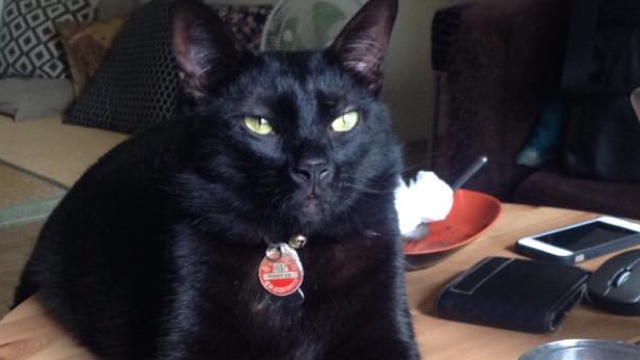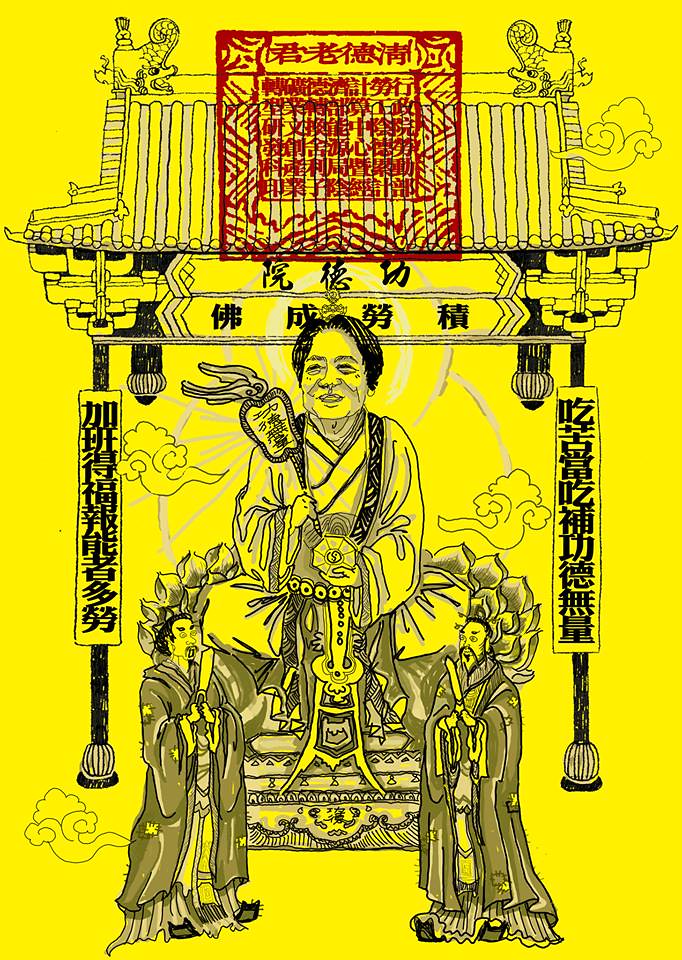 |
| I have no cover image so now is a good a time as any to say that I think my cat looks like Huang Kuo-chang |
I said I didn't want to return to party politics for awhile, and I meant it. But then in the span of about 24 hours, Handy Chiu resigned as chair of the New Power Party and legislator Hung Tzu-yung left the party in much the same fashion as Freddy Lim two weeks ago.
There is a lot of speculation floating around about the details of why the NPP seems to be in nuclear meltdown mode, and I'm not able to offer any facts that you can't find elsewhere. What I can offer is bare-faced opinion, so here we go.
In the post-Sunflower era, the nascent Third Force needed two things. The first was to have a more collective structure - lots of people who broadly agree working together with no one 'personality' taking over. The second was to balance idealism with pragmatism. While there are people in the Third Force who would agree with this, unfortunately, they haven't been able to steer the movement in that direction.
The leadership needed to be more pluralistic - at the very least, the stars of the Third Force needed to be people who specifically wanted to cultivate and mentor emerging voices in the movement, so it never got to be too much about a few luminaries but instead continually populated with emerging young talent and new ideas.
There are Third Force public figures who take such a goal seriously, including Lin Fei-fan, the new deputy secretary general of the DPP, who had at one point intentionally stepped out of the spotlight, prioritized connecting with democracy activists across Asia, has shown that the DPP is willing to work with Third Force parties, and has said publicly that one of this goals is to foster and promote new voices so it's not all about certain personalities. (I think that last bit is published somewhere, but regardless he said it publicly at a panel at LSE last summer, which I attended.)
I'd venture that Lim is another such figure - he has sought to work with other legislators in the NPP rather than seeking to control the narrative, has fostered talent within the NPP, and has eschewed power he could have easily grabbed (when Huang Kuo-chang stepped down as party chair, the job was his for the taking. He didn't take it.) He has a slick and well-managed PR machine, but he uses it far differently than Huang. Even Handy Chiu, who wasn't chair of the NPP long enough to make an impression, seemed to seek compromise, discussion and a shared spotlight.
That's the attitude the NPP - and the whole Third Force - needed.
Sadly, that's not what they, or we, got.
Next to these more democratically-minded figures, there's Huang Kuo-chang. I won't sit here blasting the guy, because I don't know him personally (we met once, but only very briefly). But just a quick skim of NPP-related news will make clear that Huang is not only a major personality within the party, but also has a tendency to dominate it. In his lengthy Facebook manifesto, Wu Cheng referenced this explicitly.
I can also say that Huang did (and does) tend to dominate the NPP decision-making process and it did (and does) turn people off. It seems to me - barefaced opinion here - that this is not just that they lack a consensus on better alternatives, but because Huang is a dominant, controlling person. He may have tried to temper this tendency by stepping down as party chair, but it doesn't seem to have worked, and has definitely driven good people away.
So, since the NPP's founding, instead of this lovely utopian vision of collective voices, it feels like there's been a tug-of-war over whether to work towards true consensus, or just let it be the Huang Kuo-chang Show. From whether to push for a host of referendums (too many to link here) that not everyone fully supported to the failed (and pointless) hunger strike to whether or not to cooperate with Ko Wen-je or other Third Force parties, to whether or not to support Tsai's re-election bid, it's been years of Huang wanting to run the show. From what people have told me, there's arrogance aplenty as well.
As you might expect, this has caused people to become disenchanted and walk away. (Lin Fei-fan has said that Huang was not the reason why he didn't join the NPP, and relations between them are strong. I can't say if that's true or just something you say on camera, but I'd argue it doesn't matter - the overall trend is there.)
That leads us to the second thing the NPP needed to be, but ultimately wasn't: a vanguard for the Third Force that wisely mixed idealism with pragmatism.
I've already said that the central issue with the NPP is a divide not between who supports whom outside of the party, whether that's Mayor Ko Wen-je or President Tsai Ing-wen, or whether or not to push for more referendums or hold a hunger strike or whatever the current 'issue' is, but rather all of these disagreements fall along a fault line of often-foolish idealism (led by Huang Kuo-chang and supported by Hsu Yung-ming) vs. guarded idealistic pragmatism (led by Freddy Lim and supported by Hung Tzu-yung). I could give a hundred examples, but let's just talk about one.
Despite strong arguments for supporting Tsai, Ing-wen for re-election, the NPP was unable to reach a consensus, I gather in great part because Huang was just not having it (he did threaten to leave if the NPP became a 'little green' after all.)
But here's the thing - and I've said this before:
The true progressives need to...realize firstly that not that many Taiwanese are as progressive as they are and their ideas are not shared by a majority of the population. That means more needs to be done to win over society. It means teaming up with the center, even if the center is slow to act. Doing so doesn't mean you have to support the center indefinitely.
Or, as a very smart friend of mine once said, activists have to realize that change won't happen just because they march, protest, strike, write and occupy. Change happens because they do those things, bring their ideas to the rest of society and show the establishment that their causes enjoy some popularity and can be winning issues. Activism needs friends in the establishment to get things done, and the more progressive members of the Establishment need the activists to get society to care about those issues. In Taiwan, the activists need Tsai, and Tsai needs the activists.
We're at a critical juncture now, where it's not hyperbole to say "this is do or die for Taiwan". I'll write more about this later, but electing a pro-Taiwan president now, as China is ramping up its disinformation, election interference and aggression campaigns as well as activating its latent networks to bully Taiwan into the fold, is of urgent importance. The top priority now is simple: Han Kuo-yu must be stopped. Lim, Lin and others understand this, and are willing to set aside differences with the less liberal DPP, but Huang and Hsu don't seem to get it. They're clinging to this idealist notion that in 2020, it is possible to undermine Tsai but not have Han win. And that's just not the case. It's fine to keep criticizing Tsai and the DPP, but damn it guys, do that after she wins.
We needed a Third Force, and an NPP especially, that understood this and took the right side when the chips were down. We needed them to see that Tsai may not be perfect and it's necessary to continue to hold her and her party accountable, but that it would hurt Taiwan far worse to enable Han to win, however indirectly. We needed them to understand that their energy is best spent trying to win people to progressive causes while supporting the best possible viable candidate and establishment ally, rather than assuming they can do what they want because their ideals are obviously the correct ones. (They are, but if most voters don't see it that way, it doesn't matter much, does it?)
Sadly, that's not the NPP we got, and it's unclear that such a consensus will arise from elsewhere. The idealists "won", if by "won" we mean "blew up the party so now it's just Huang And Friends". I don't see a party built that much around one not-terribly-likable personality, which keeps taking hard turns into unrealistic idealism, lasting particularly long. Personality-parties rarely outlast their key figurehead, and overly idealistic ones are likely to perish even sooner.
What have we got, then? A hobbled, bleeding NPP, a few scattered parties that occasionally work together, and a couple of popular legislators who are now independent.
I've said before that the question of whether the NPP would lose relevance if it takes an overly-pragmatic route of becoming a 'little green' by supporting Tsai and the DPP is a moot one: moving away from supporting the DPP at key junctures, turning instead towards more radical platforms, would render it a fringe party, and that's just another kind of irrelevance.
It looks, then, like they're gunning for irrelevance.

